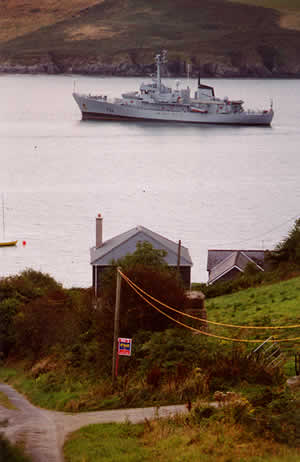| |
Hold fast ye dry land sailors all, and listen to my tale.
It recalls an expedition bold and started from Kinsale
As stout a crew as ever you knew, who had never been to sea,
But who ventured all in an open yawl on a trip to Ballinadee.
The cargo consisted of some "hard tack" and crubeens,
Some junks of meat you never could eat and a dozen of dry scalpeens,
A keg or two of "mountain dew" and a dozen of lemonade,
And the symphony band was a gadget grand that the carpenter newly made.
They left one Sunday afternoon, this jolly crew of tars,
And each one carried his overcoat and a couple of cheap cigars
With many sighs and fond Good-byes, the girls all around did flock,
Gone were their hopes when the crew cast ropes and cleared from the Short Quay dock.
As soon as they left Kinsale behind, with helm hard to port,
The gallant ship was making fast for old King James' Fort,
When the donkey-man cried out abaft: "Steer clear the harbour rock",
But the devil a tug we gave the lug till we landed at the Dock
But soon the siren blew again, each one the oars did grip,
Through blinding spray and angry say, we passed the Ferry Slip.
We held our sail before the gale, the ship was on her own,
And we raised a cheer as we passed quite near the castle of Ringrone.
The firemen all got rusty and they said they'd go to bed,
As the watchman on the gangway shouts, "I fear there's rocks ahead".
But the man at the steer, who was full of beer, from the mate got a stiff poltogue.
While you'd wink your eye we were high and dry on the headland of Comogue.
The captain cried, "Come on my lads, your seamanship to prove."
So we put our shoulders to the wheel and gave a powerful shove,
And we raised a cheer as we steered her clear of a sharp and dangerous ledge;
Through the blinding foam we sang "Home, Sweet Home" right under the Iron Bridge.
Tissasson, Ballywilliam and Killaney passed our view.
With plenty of coal in each stoke hole, just like a bird she flew,
'Till the cook in the galley shouted out: "She's making water fast."
So we took a bag and raised our flag and nailed it to the mast.
Now Bailed was sighted as the clock was striking six.
The skipper said to all the crew, "I fear we're in a fix.
So large a boat will never float till the tide rises full brim."
So the cry arose: "Take off your clothes, we'd better get out and swim."
With heartfelt thanks we reached the banks and safely came to land,
The musical director then started up the band,
We chorused "God save Ireland" and the "Boys of Garryowen",
And Ballinadee resounded as we gave "The Holy Stone"
The local folk surrounded us, they came from far and near,
When they saw those gallant heroes, they raised a rousing cheer.
The mayor, himself, conducted us into the nearest Pub,
They filled a can for every man and gave us plenty grub.
So this, friends, is the story of this crew of jolly tars,
Who sailed away one Summer's day and came home on outside cars.
My bosom swells when history tells of this gallant company
Who ventured all in an open yawl on a trip to Ballinadee.
|
![]()








